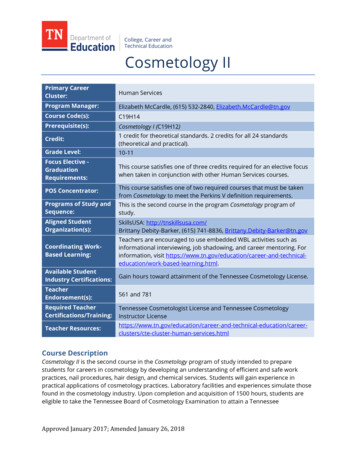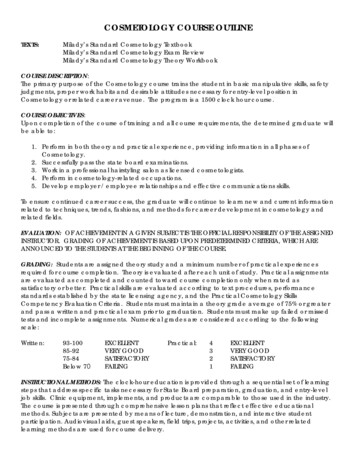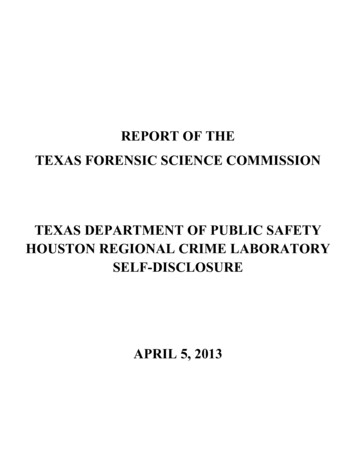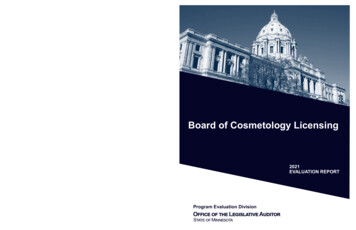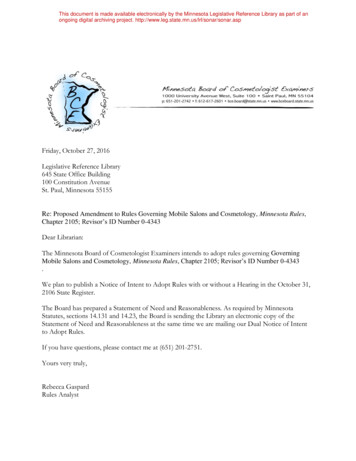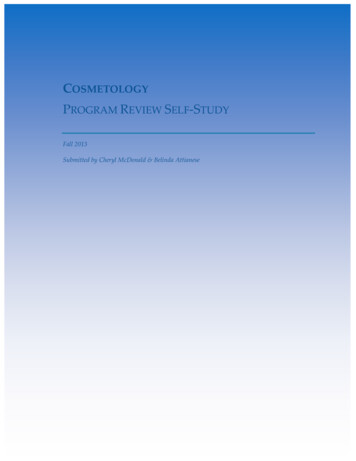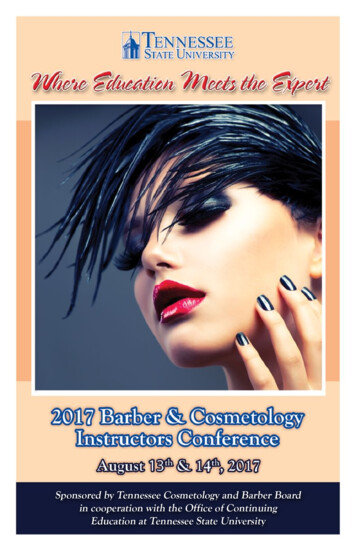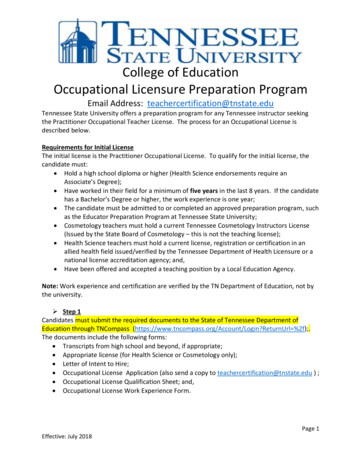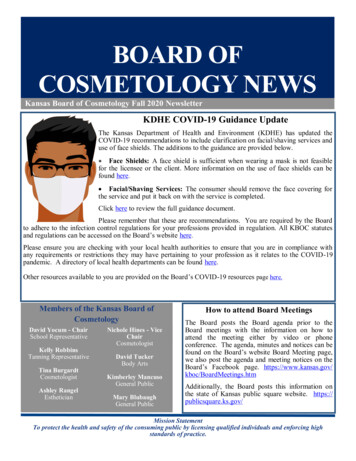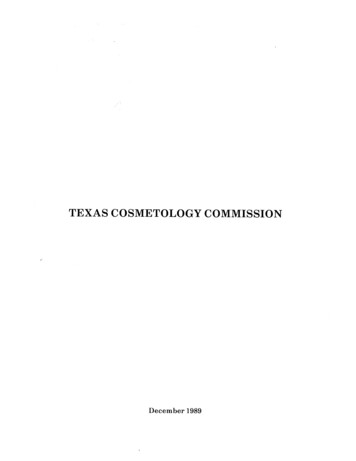
Transcription
TEXAS COSMETOLOGY COMMISSIONDecember 1989
Table ofContentsPAGEBackgroundResultsofReviewCreation and Powers1Policy-making Body1Funding and Organization2Programs and Functions3Overall Approach to ReviewAssessment of Need to RegulateIssue 1 Discontinue regulation and transferbeauty school oversight to theTexas Education Agency9-Assessment of Organizational AlternativesIssue 2 Transfer agency functions to theTexas Department of Licensingand Regulation and maintaincurrent board structureIssue 3 Combine the Texas CosmetologyCommission with the State Boardof Barber Examiners and mergeagency functionsRecommendations if Agency is ContinuedSummaryPolicy-making BodyIssue 4 Require the governor to designatethe board chairmanOverall AdministrationIssue 5 Provide agency authority to set feesto cover costs of regulationEvaluation of Programs13-19-2531-35-Issue 6-Reduce the level of regulation ofcosmetology operators and instructorsto certification3739
Table Issue9Issue 10--Require the use of a nationalexamination and repeal therequirement for a practicalexaminationReduce the regulation of manicuristsand discontinue the inspection ofspecialty shopsDiscontinue licensing and inspectionof beauty shopsEstablish student tuitionprotection fundAcross-the-BoardRecommendationsA endix4347515559Exhibit A- SunsetComparisonCurrent Practice toStaff ofRecommendationsExhibit BExhibit C--Scope of Practice Overlap andDifferenceComparison of RegulatoryFunctionsIJ616365
BACKGROUND
Texas Cosmetology CommissionBackgroundCreation and PowersComprehensive licensing regulation of hairdressers and cosmetologists beganin Texas in 1935 when the 44th Legislature created the State Board of Hairdressersand Cosmetologists and required the licensure of beauty operators, beauty schools,manicurists, instructors and beauty shops. In 1953 the statute was amended tocombine and expand the services performed by hairdressers and cosmetologists. TheTexas Cosmetology Conunission (TCC) was created in 1971 by the 62nd Legislatureto replace the State Board of Hairdressers and Cosmetologists.The Texas Cosmetology Commission regulates the cosmetology industry in Texasby issuing and renewing licenses, providing licensure examinations andinvestigating complaints related to individuals or establishments. The TCC alsoinspects beauty salons and beauty culture schools. Unlicensed individuals andestablishments are prohibited from practicing cosmetology and are investigated bythe agency and reported to civil authorities. Disciplinary and other administrativehearings regarding licensees are conducted as required.Since 1983, a rider in the appropriations bill has required that an interagencycontract be signed between the State Board of Barber Examiners and the TexasCosmetology Commission for the purpose of implementing a statewide crossoverinspection and enforcement program. Under this contract, shops that employ bothcosmetologists and barbers are inspected by the State Board of Barber Examiners.Policy-making BodyThe commission is composed of seven members, six of whom are appointed bythe governor with the advice and consent of the senate for staggered six-year termsand one serves as an ex- officio member. Two members hold valid operators licensesand have no direct or indirect financial interest in or affiliation with a beauty shop orbeauty culture school. One member holds a valid beauty shop license and has nodirect or indirect financial interest in or affiliation with a private beauty cultureschool. One member holds a valid beauty culture school license and has no financialinterest in or affiliation with a beauty shop or salon. Two members represent thegeneral public and have no direct or indirect financial interest in or affiliation withany facet of the cosmetology industry in Texas. The Assistant Director for Trade andIndustry Education and Vocational Educational Programs of the Texas EducationAgency is an ex-officio member.Members must be residents of Texas and have been actively engaged in the areathat the person represents for the five years immediately preceding appointment.The TCC elects one of its members to serve as chair for a term of two years. Thecommission is required to meet at least once each year and generally meets seventimes each year. Members are required to attend at least one half of all regularlyscheduled meetings or forfeit their membership on the commission.SAC A 205/891Sunset Staff Report
Texas Cosmetology CommissionBackgroundThe duties of the commission are to issue rules consistent with the cosmetologylaw, prescribe the minimum curricula and hours of subjects to be taught in thebeauty culture schools and prescribe the method and content of the examinationsadministered under the Act. The commission establishes sanitation rules designedto prevent the spread of infectious or contagious diseases, and may establish rules forthe continuing educational opportunities for licensees.Funding and OrganizationThe Texas Cosmetology Commission collects licensing and inspection feeswhich are deposited in the state’s General Revenue Fund. In turn, the commissionreceives its legislative appropriation from general revenue. In fiscal year 1989 thelegislature appropriated 1,256,156 for agency operation. Commission expendituresare divided in four major activities as follows: administration 152,016; licensing,certification and testing 369,193; enforcement and investigations 592,812; anddata services 142,135. Exhibit 1 shows percentages of board activities byexpenditure. During the past five years the TCC has generated through licensingfees and penalties considerably more revenue than it has received throughappropriations. Exhibit 2 shows agency revenues and appropriations for fiscal years1985 through 1989.Exhibit 1Expenditures by ActivityFiscal Year 1989Computer Services 142,135 (11%)Enforcementand Investigation 592,812 (47%)Administration 152,016 (12%)%%Regulation, Licensingand Examination 369 193 (30%)Total Appropriation 1 256 156 (100%)SAC A 2O5/892Sunset Staff Report
Texas Cosmetology CommissionBackgroundExhibit 2Revenues and AppropriationsFiscal Years 1985 he TCC is authorized 46 full-time positions. The agency is currently authorized20 full-time inspectors distributed throughout the state. Twenty-six employees,including five examiners, perform administrative duties at the TCC office in Austin.Exhibit 3 shows the organizational structure of the agency and Exhibit 4 showsinspection regions throughout the state.Programs and FunctionsAdministration and Data ServicesThe commission’s administration is responsible for controlling all agencyactivities and ensuring that proper accounting procedures and internal controlpolicies, as recommended by the State Auditor’s Office, are in place. Theadministration handles all telephone inquiries from licensees, routes all incomingmail on a daily basis, makes timely deposits of all funds received and maintainsregular contact with field personnel on policies and procedures.The agency maintains data services to support the processing of all licenses,including printing and issuing licenses. All information on licensure andenforcement is computerized allowing agency staff to process and renew licenses,certify that new salons and schools meet licensing requirements, coordinate theenforcement division’s inspection activities as well as receive student credit hours ona monthly basis.SAC A-205/893Sunset Staff Report
Exhibit 3Texas Cosmetology CommissionOrganizational Chartti t :CGovernorCosmetology CommissionExecutive Director(1) ExemptEnforcement(1) Administrator ofTechnical ProgramsPersonnel(1) Key Entry Supv (Personnel Officer I)ICl)CDCl)CDQ—Data Services(1) ADP ns(1) AdministrativeTechnician IVII(1) Word Processor I(1) Key EntryOperator III(4) Inspector III(12) Inspector II(4) Inspector III(1) Inspector I(Key Entry Op IV)(1) ADP ControlClerk I(1) Clerk III[1j(1) Inspector I(Key Entry Op IV)(2) Clerk III(1) MicrofilmCamera Operator IFinance(1) Chief Accountant I-I(3) Inspector (1) Inspector II(1) Accountant II(2) Accounting Clerk(1) Clerk IIII(1) AdministrativeTechnician II(1) Key EntryOperator II(1) ClericalSupervisor III(1) Clerk III
BackgroundTexas Cosmetology CommissionExhibit 4Location of Inspections RegionsFiscal Year 198921Inspector District # and City:24 Kingsville03- Edinburg31 El Paso09 & 10- San Antonio (2)18- Baytown21 & 22- Houston (2)15- Orange04- Garland26- Abilene--SAC A-205/8927 Grand Saline05 & 06- Dallas (2)07-Bedford14- Lubbock25 Eagle Lake12 Waco19- Amarillo01 Austin---5Sunset StafYReport
-Texas Cosmetology CommissionBackgroundLicensingThe TCC offers seven types of licenses including operator, instructor, manicurist,facial, shampoo, hairweaving and wig specialist. The TCC licenses over 145,000individuals, 20,000 shops and 400 schools. Exhibit 5 shows the number of licensesgranted by the TCC in fiscal years 1987 through 1989. The licensing, certificationand examination division is responsible for processing, printing and microfilming alllicenses. The division tests all students applying for licensure and notifies them oftheir grade. In addition, the division processes new salon applications, certifiesthose applications for correctness and notifies inspectors of which salons to inspect.The division is also responsible for processing reciprocity applications and transcriptrequests.Exhibit 5LicensesGranted FY 1987 and FY 1989L ors1,5761,6861,910Shampoo Specialist175160147Facial 203181OperatorsHairweaving SpecialistWig SpecialistBeauty and Specialty SalonsBeauty SchoolsRequirements for an operator license include a seventh grade education and1,500 clock hours of instruction in a private beauty culture school or 1,000 hours ofinstruction in beauty culture courses and 500 hours of related course work in apublic high school. The applicant must be 16 years of age, pass a written andpractical examination and pay a 25 license fee. Individual licenses are issuedbiennially on a staggered basis with a renewal fee of 25. A license that has beenexpired for less than 30 days may be renewed with a 10 delinquency fee. If thelicense is expired for more than 30 days, but less than five years it may be renewedafter submission of an application and payment of a fee based on the number of yearsthe license has been expired and a 25 delinquency fee. If a license has been expiredfor more than five years, the applicant must submit an application, pay anexamination fee, pass the examination, and pay a 50 reinstatement fee.The licensing examination is developed by a committee consisting of beauty shopand beauty school owners, operators, and cosmetology instructors. The examinationis administered and graded by examiners of the agency and the applicant must pay a 25 fee covering a student permit to attend school, the exam application, oneSAC A-205/896SurisetStaff Report
Texas Cosmetology CommissionBackgroundtranscript and the examination. The written test consists of questions covering rulesand regulations, style and technique, and health and sanitation. The practicalportion of the exam tests the examinee’s knowledge of proper health and sanitationprocedures as well as their ability to apply chemicals properly (a non-toxic substituteis used), style hair, and perform facials.The statute authorizes the commission to issue a license to an out-of-stateapplicant who holds a valid license from another state that has substantiallyequivalent licensing standards. The applicant must submit an application and pay a 100 fee plus the applicable license fee. The license enables the applicant to performthe services stated on the license and is subject to the rules and regulations in thecosmetology act.The TCC also licenses beauty shops and beauty culture schools. An applicant fora beauty shop license must submit an application, meet the requisites for a beautyshop established by the conimission, and submit a 40 salon inspection fee and a 35license fee. Beauty shop licenses are renewed biennially on a staggered basis with arenewal fee of 35. Additional fees are in place for delinquent renewals.An applicant for a beauty culture school license must submit an applicationcontaining a detailed floor plan of the school, furnish a surety bond in the amount of 5,000, and pay a 500 license fee and a 200 inspection fee. An applicant willreceive a beauty culture school license if the inspection shows that the cosmetologyact and the rules of the commission have been met and the applicant has notcommitted an act which constitutes a ground for denial of license. Beauty cultureschool licenses are renewed annually with a renewal fee of 200. A beauty cultureschool license which has been expired for 30 days or more may not be renewed. Theestablishment must go through the full application process and pay the requiredfees.EnforcementThe enforcement and investigation division has the responsibility of inspectingcosmetology salons and schools. The purpose of these inspections is to protectconsumers by ensuring that licensees and licensed establishments are in compliancewith the cosmetology statutes, general rules and regulations, and sanitary rulings ofthe commission. Inspections are unannounced and performed by inspectors locatedthroughout the state. The commission has 20 authorized inspector positionsavailable. Most shops are inspected twice a year, while schools are inspected threetimes a year. Inspections include checking the expiration dates of individuallicenses and shop licenses, surveying the condition of facilities, and looking atcosmetology equipment and tools to determine if proper sanitary procedures arefollowed. Inspectors also check the documentation of hours accrued by students.During fiscal year 1989, the division conducted 24,252 salon inspections and 1,397school inspections.Upon discovery of a violation, the inspector directs the licensee to have theproblem corrected within 10 days. The inspector tries to return to the shop to seethat the licensee has complied; however, frequently the inspector checks forcompliance during the next regular inspection. Those licensees committing three ormore similar violations in a 12 month period or any sufficiently serious offense arereported to the agency for possible revocation or suspension of their license. In fiscalyear 1989, 1,120 violations were issued for various offenses. Thirty-seven percentSAC A-205/897Sunset Staff Report
Texas Cosmetology Commission-Backgroundwere issued for licensing infractions, while 13 percent were issued for violationsrelated to sanitizing tools and equipment.During inspections, if the inspector finds a license that has been expired for morethan 30 days or an unlicensed practitioner, a complaint is filed with a Justice of thePeace Court (JP). The court, upon conviction, is required to issue a fine of not lessthan 25 nor more than 200. During fiscal year 1989, the commission inspectorsfiled 277 cases with the Justice of the Peace Courts for unlicensed practice ofcosmetology. The courts dropped almost 50 percent of those cases filed, assessedfines in 45 percent of the cases, and five percent are still pending.Complaints against an individual, a shop or a school for an alleged violation, canbe initiated by consumers, licensees or the agency itself. Complaints originatingfrom licensees or consumers lead to an investigation and the issuance of a violation ifwarranted. During fiscal year 1989 the agency received 137 public-initiatedcomplaints. Forty four percent of the complaints were against individuals forpracticing without a license, keeping pets in salons, or withholding student clockhours in the schools. Thirty one percent were closed by the agency for nonjurisdiction while eighteen percent were complaints unclearly defined and then sentto inspectors for investigation. The remaining seven percent involved allegationsthat facilities, equipment or implements were unclean.After the agency discovers a violation, through routine inspections or throughpublic-initiated complaints, it may dismiss it or proceed with disciplinary actionthrough its own hearings process. The general rules and regulations grant the TCCthe authority to conduct informal hearings of disciplinary action. The informalhearing is chaired by a board member or a person designated by the board and thecommission and licensee work for an equitable solution. The findings of the informalhearings are not final or effective until approved by the full commission. Duringfiscal year 1989 the agency held four informal hearings in which four licenses weresuspended (probation). Additionally, the TCC has the statutory authority to conductformal hearings to suspend or revoke licenses. Formal hearings require the presenceof the full commission and are conducted according to APTRA guidelines. Theagency held no formal hearings during fiscal year 1989.SAC A-205/898SunsetStafTReport
RESULTS OF REVIEW
Overall Approach to the Review
Texas Cosmetology CommissionOverall ApproachOverall Approach to the ReviewPrior Sunset ReviewAs part of the overall review of the Texas Cosmetology Commission, the staffreport to the Sunset Advisory Commission prepared in 1979 was reviewed. Inaddition, the recommendations adopted by the Sunset Commission were examinedand compared to the current activities of the agency.In 1979, the initial sunset review determined that the commission wasperforming its functions adequately, had been generally effective in meetingstatutory objectives and mandates, and was basically self supporting. However, thereview concluded that the Texas Cosmetology Commission and the State Board ofBarber Examiners duplicated the functions of licensing, examination, andenforcement of regulations related to two similar target groups and that merging theagencies could result in a significant reduction of state expenditures whilemaintaining the current revenues generated by licensing efforts. More efficient andtimely issuance of barber licenses and better management of the inspection processcould be achieved through utilization of computer services already in use by theCosmetology Commission.Other operational changes recommended by the sunset staff in 1979 included: the modification of the statute to prevent the operator representative onthe commission from having financial interest in a private beautyculture school; the deletion of the statutory requirement for tuition payment prior tothe examination of private school students; the modification of the statute provisions relating to the grounds forlicense revocation or suspension to include “incompetency ornegligence”; and the implementation of a revised staggered renewal system to insurebalanced workloads and revenues over the biennial periods.In 1979, the Sunset Commission did not concur with the staff on therecommendation of merger, but did support the recommendations for the addition oflanguage relating to cosmetologist incompetence or negligence as grounds forsuspension or revocation of certificate and for the modification of the statuterestricting the operator. The commission also recommended that the biennialrenewal system be replaced by a one-time certification, that functions related to theregulation of cosmetology shops and wig salons be transferred to the Texas Board ofHealth and that the commission should no longer regulate public or privatecosmetology or wig schools, cosmetology or wig instructors, manicurists, wigspecialists, specialty occupations and specialty salons. The commission also statedthat the acquisition of a health certificate can only ensure that an individual is freefrom contagious disease one day out of a two-year period, but offers little systematicassistance in reaching the goal of protecting the public health. The commission alsorecommended the following:SAC A-205/899Sunset Staff Re port
Texas Cosmetology CommissionOverall Approach modification of the commission’s composition to reflect only the regulatedportions of cosmetology and include one-third public membership; assumption of the responsibility of regulation of private cosmetologyand wig schools by the Texas Education Agency; deletion of cosmetology school hour prerequisites to take thecertification exam; replacement of reciprocal licensure with certification by endorsement; revision of complaint processing procedures to allow complaint trackingand complaint notification; omission of all provisions which have the effect of restrictingadvertising and competitive bidding; and addition of conflict of interest provisions which apply to commission andboard of health members and employees who administer or enforce theAct.The sunset bill passed by the 66th Legislature did not adopt all of therecommendations made by the Sunset Commission; however, the structure of theboard was changed to include two public members, a system of complaint trackingwas established, conflict of interest provisions were added and the agency becamesubject to the Texas Open Meetings law. In addition, other sunset across-the-boardprovisions were added to the statute. These provisions require standard time framesfor licensees who are delinquent in the renewal of licenses, provide for an analysis ofthe licensing exam to those who fail the exam and specify board hearingrequirements among other changes.Approach to Current ReviewAs part of the analysis of the agency’s effectiveness and efficiency, the sunsetreview examined both the current operations of the agency and the findings andrecommendations of the sunset staff and sunset commission which resulted from thereview conducted in 1979.In accordance with the Sunset Act, the review included an assessment of the needto continue the regulatory functions performed by the agency; whether benefitscould be gained by performing the function through another agency; and finally ifthe function is continued, whether changes are needed to improve the efficiency andeffectiveness of the agency.To make the assessment of these general areas a number of efforts wereundertaken. These included: review of previous sunset staff recommendations; review of documents developed by the agency, legislative reports, otherstates and books containing background resource material; interviews with the agency staff;SAC A-205/8910SunseiStaff’ Report
Texas Cosmetology Commission Overall Approach visits to several beauty shops and a beauty culture school in the Austinarea with an inspector; attendance at a commission meeting; interviews with other state agency personnel that interact with theagency; phone interviews with other states; and meetings with interest groups and individuals affected by thecommission.The results of the assessment of each of these areas is contained in the followingmaterial. In addition, the overall impact of the recommendations are summarized inthe appendix, Exhibit A.SAC A-205/89IISunset Staff Report
Assessment of Need to Regulate
-Texas Cosmetology CommissionNeed to RegulateBACKGROUNDIn order for the regulation of an occupation through licensure to be justified as avalid state effort, several conditions must be present. First, the unlicensedpractice of the occupation should pose a serious risk to the health, safety orwelfare of the public. Second, the benefits to the public should clearly outweighany potential harmful effects, such as a decrease in the availability ofpractitioners. Finally, the duties of the occupation should be of a complexity thatconsumers cannot properly evaluate the appropriateness of the service or thequalifications of the practitioners.To assess whether the above conditions exist to an extent that would justify theagency’s continuation, the staff report prepared in 1979 for the Sunset AdvisoryCommission and the recommendations adopted by the commission were reviewedand the agency’s current functions were evaluated.Each individual category of licensure was evaluated separately and theregulation of beauty salons and schools was also examined to determine theextent to which the public is protected under each operation.In 1921, the legislature enacted a law requiring persons “owning, operating, ormanaging barber shops or beauty parlors” to register with the Texas Board ofHealth. The law set out mandatory sanitation provisions, but no enforcementmechanism was provided. Thus, the legislation was little more than aregistration law.Over time, the focus of the laws regulating cosmetology have expanded beyondthe original sanitation provisions. The law now provides for licensure ofoperators, instructors, manicurists, facialists, hair weavers, wig specialists,salons including specialty salons, and beauty culture schools. A large proportionof the agency’s work is making sure that only persons with a valid license areallowed to practice cosmetology.The sunset review of the agency in 1979 resulted in the Sunset Commission’srecommendation that the level of regulation being provided by the TexasCosmetology Commission could be reduced without subsequent damage toconsumers. The commission recommended that licensure be replaced with a onetime certification for cosmetologists that would be valid indefinitely, and theregulation of manicurists, facialists, hair weavers and wig specialists was notneeded. Finally, the sunset commission recommended the transfer ofresponsibility for regulating beauty culture schools to the Texas EducationAgency. These recommendations were not adopted by the 66th Legislature.Neither the agency’s functions nor the types of problems handled by the agencyhave changed significantly since the review in 1979, as the findings belowSAC A-205 /89Discontinue Regulation13Sunset Staff Report
Texas Cosmetology CommissionNeed to Regulatesubstantiate. The current evaluation of the need to continue regulating thevarious cosmetology occupations, salons and schools indicated the following: There is no serious public health reason for the board to regulate operators,manicurists, facialists, hair weavers, shampoo specialists, or wigspecialists. The Texas Department of Health reports that there have beenno diseases, including the AIDS virus, which have been reported to havebeen acquired through the practice of cosmetology, although head licecould potentially be spread if proper techniques were not followed forcleaning equipment.----------During the review, complaints for fiscal year 1989 were evaluated. Outof 137 consumer complaints filed, ten of the complaints, or sevenpercent involved allegations that salons were unclean or that thecosmetologist did not properly clean tools or linens. Such complaintsmight be considered related to public health, however, it is frequentlydifficult for the inspectors to ensure correction of the problem andpunitive action is not taken against the licensees.The Texas Department of Health can deal with such problems under itsauthority under the Communicable Disease Act.The type of violations issued by the agency are not the type that presentserious risk to the safety or welfare of the public. The agency inspectorsissue most violations for licensing infractions. A total of 1,120violations were issued in fiscal year 1989. Thirty seven percent wereissued for practicing without a license or permit, doing work notallowed under a given license, not displaying a license, or hiring anunlicensed individual. Only 13 percent were issued for violations ofregulations that require sanitizing of equipment and tools. Theinspectors attempt to verify correction of violations; however, there is alimit to what can be done to ensure compliance. It is difficult to returnto the salon to make sure the violation is corrected, so the inspectorfrequently waits until the next inspection. Since salons are inspectedabout two times a year, the effectiveness of issuing the violations islimited.On occasion, enough violations or a sufficiently serious violation willcause the commission to conduct an informal hearing in an effort tocorrect a problem situation. In fiscal year 1989, three informalhearings were conducted on violations discovered through routineviolations resulting in the suspension (probation) of all three licenses.The violations involved poor condition of a school facility and poordocumentation of student hours in the schools. The commission does nothave any records of revoking a license. Records were only available forthe past two years; the agency expressed uncertainty about revocationsbefore that time, but indicated that there probably were not anylicenses revoked.Unlike the type of loss a person might incur from the purchase of afaulty automobile or a poorly constructed home, the loss to a consumerfrom a bad haircut or manicure is considerably more limited.SAC A-205/89Discontinue Regulation14Sunset StafTReport
TexasCusmetologyCommissionNeed to Regulatep.Other avenues exist for consumers to recover damages which result fromthe wrong doing of a cosmetologist. Anyone injured in any way by anothermay seek to recover damages through civil court procedures throughjustice of the peace courts. This method is relatively inexpensive for theinjured person. The attorney general is responsible for administering theDeceptive Trade Practices Act which enables the office to investigate andfile suit to stop activities which are deceptive. The office can formallypursue any case that it determines affects the public interest and, in somecases, can obtain restitution for the aggrieved person. Such formal actionmay be unlikely with the type of problems the agency has dealt withhowever. Staff of the attorney general’s office also attempt to informallymediate all complaints t
Texas Cosmetology Conunission (TCC) was created in 1971 by the 62nd Legislature to replace the State Board ofHairdressers and Cosmetologists. The Texas Cosmetology Commission regulates the cosmetology industry in Texas by issuing and renewing licenses, providing licensure examinations a
